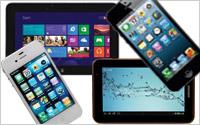electronics
Tablets, Tablets, Everywhere; Is The Thrill Still There?
- by Karl Greenberg , September 21, 2013
 Going mobile? Who isn't? Unfortunately, while more people are using smartphones, tablets and everything between, and while electronics makers are feeding the frenzy
with more sophisticated machines, consumers are not necessarily ecstatic.
Going mobile? Who isn't? Unfortunately, while more people are using smartphones, tablets and everything between, and while electronics makers are feeding the frenzy
with more sophisticated machines, consumers are not necessarily ecstatic.Tablet sales are likely to be up 70%, stealing sales from laptops and desktops (remember those?) Those archaic platforms are moving toward a 10% drop. Global PC shipments dropped 11% in the second quarter, the fifth straight quarter of contraction. This from the American Customer Satisfaction Index (ASCI), which queries some 70,000 people each year to get a pulse on consumers' sentiments about products and services.
Across the board, customer satisfaction with desktops, laptops, and tablets is down 1.3%, per ASCI, -- no surprise -- tablets have a lead over both desktops and laptops. "Customer expectations of computer products are high, and the industry is under pressure to keep up with ever-growing demand for devices that are faster, more powerful, and offer innovative and improved features," say the study authors.
advertisement
advertisement
Good news for Apple: it still has a wide lead over everyone else, and especially over Windows-based manufacturers, by 8-12%. The Index says Microsoft has gotten nothing from its Windows 8 platform, which was an effort to move away from the traditional Windows architecture to something that, well, has confused and confounded people.
And Apple is hugely dominant in tablets, although sales are slowing for both the tablet and PC -- even while iPhone sales are rising, the Index reports. After Apple come Hewlett-Packard, Dell, Toshiba, Acer, and everyone else in the long tail. Dell is down 2% in satisfaction, and Acer is off 3% in the study.
In major appliances, Whirlpool leads in satisfaction, although the segment is down. After Whirlpool are General Electric and Electrolux, with the latter down 5%. "Whirlpool tops the industry again this year -- both in customer satisfaction and in market share, which is actually a rare feat. In most other industries, it is difficult for companies to combine high market share and high customer satisfaction."
The report cites Mercedes-Benz and Lexus as examples of companies that follow the usual pattern of low market share matched with high satisfaction, although arguably as luxury products they inhabit their own sector, and affluent consumers are more likely to do a lot of research and have a strong relationship with retailers. Taken to a logical extreme, it's hard to imagine an owner of a Lamborghini reporting dissatisfaction with his or her vehicle.




